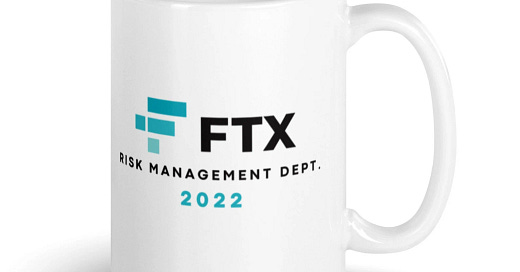What happened at FTX?
Don't use FTX as a case against cryptocurrencies. Take it from a person who dislikes cryptocurrencies.
Author’s note: this article was published about ten days after the demise of FTX, a preeminent cryptocurrency exchange. Although the insights we had at the time were rather limited, I think the write-up stood the test of time.
It is impossible to avoid the headlines about the collapse of FTX, a major cryptocurrency exchange built by an MIT prodigy, Sam Bankman-Fried. What’s less clear is what happened behind the scenes; I’ve been following the events fairly closely, so here’s my best take.
For the most part, the story seems simple. FTX claimed to operate like a brokerage: a mere custodian of their customers’ assets, kept at an arm’s length from other business activities. In reality, the money flowed to a network of other businesses controlled by Mr. Bankman-Fried. Some of the transfers might have involved the purchase of self-issued securities at made-up valuations. In other cases, there was no attempt at accounting at all.
What ultimately happened to the billions in customers’ funds will require some forensic work, but it’s likely that the money is gone, perhaps squandered on unlucky bets made by Alameda Research, one of the affiliated companies. In his recent court filing, the liquidator had this to say:
“I have over 40 years of legal and restructuring experience. I have been the Chief Restructuring Officer or Chief Executive Officer in several of the largest corporate failures in history. I have supervised situations involving allegations of criminal activity and malfeasance (Enron). I have supervised situations involving novel financial structures (Enron and Residential Capital) and cross-border asset recovery and maximization (Nortel and Overseas Shipholding). […]
Never in my career have I seen such a complete failure of corporate controls and such a complete absence of trustworthy financial information as occurred here.”
At least some old-fashioned embezzlement appears to have been going on too. The filing includes this gem:
“In the Bahamas, I understand that corporate funds of the FTX Group were used to purchase homes and other personal items for employees and advisors. I understand that there does not appear to be documentation for certain of these transactions as loans, and that certain real estate was recorded in the personal name of these employees and advisors on the records of the Bahamas.”
There’s also a personal loan of a billion dollars from Alameda to Mr. Bankman-Fried.
In short, the collapse of FTX had little to do with cryptocurrencies. All signs point to a more ancient form of grift — the kind that Bernie Madoff pulled off using old-school financial assets under the watchful eye of the FTC.
A more fascinating question is why the company not only faced little scrutiny, but received nearly-universal praise from pundits in the run-up to the crash. A now-scrubbed piece from Sequoia Capital, a major VC firm, is worth quoting at length:
"The FTX competitive advantage? Ethical behavior. SBF is a Peter Singer–inspired utilitarian in a sea of Robert Nozick–inspired libertarians. He’s an ethical maximalist in an industry that’s overwhelmingly populated with ethical minimalists. I’m a Nozick man myself, but I know who I’d rather trust my money with: SBF, hands-down. […]
After my interview with SBF, I was convinced: I was talking to a future trillionaire. Whatever mojo he worked on the partners at Sequoia—who fell for him after one Zoom—had worked on me, too. For me, it was simply a gut feeling. I’ve been talking to founders and doing deep dives into technology companies for decades. It’s been my entire professional life as a writer. And because of that experience, there must be a pattern-matching algorithm churning away somewhere in my subconscious. I don’t know how I know, I just do. SBF is a winner."
It wasn’t just Sequoia; puff pieces about Mr. Bankman-Fried appeared in The New York Times, on Vox.com, and in countless other major outlets across the country. My guess is simple: he was their guy. A child of humble academic workers; an advocate for stronger regulation in the crypto markets; a proponent of a radical flavor of effective altruism and an outspoken critic of greed; a prominent donor to democratic causes. He was the billionaire they wanted, and you don’t look a gift horse in the mouth.
Even as the charade started to unravel, the NYT published one final puff piece, letting SBF portray himself as a victim of circumstance:
“Even as he kept hiring down, Mr. Bankman-Fried built an ambitious philanthropic operation, invested in dozens of other crypto companies, bought stock in the trading firm Robinhood, donated to political campaigns, gave media interviews and offered Elon Musk billions of dollars to help finance the mogul’s Twitter takeover.
Mr. Bankman-Fried said he wished ‘we’d bitten off a lot less.’”
In many respects, the coverage of Mr. Bankman-Fried reminds me of the story of Dan Price, a media circuit darling once dubbed “the one moral CEO in America”. Like SBF, he said all the right things: he roasted greedy oil executives, announced he’s taking a pay cut to increase the wages of his workers, and campaigned with progressive politicians. He had catchphrases such as "lifting someone out of poverty is the most effective anti-depressant in the world". He turned out to be an awful human being — but for years, nobody looked up close.
I don’t think the collapse of FTX is a reason to look differently at cryptocurrencies: they are as risky as they were before. Perhaps a better takeaway is to be twice as diligent when someone is telling you precisely what you want to hear.


